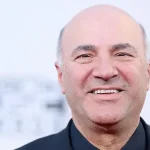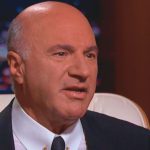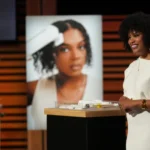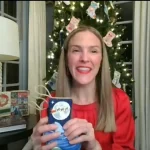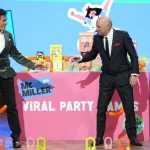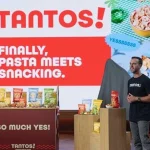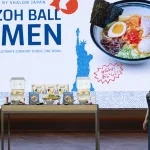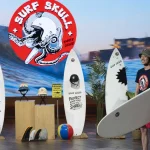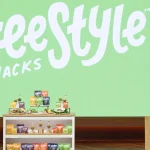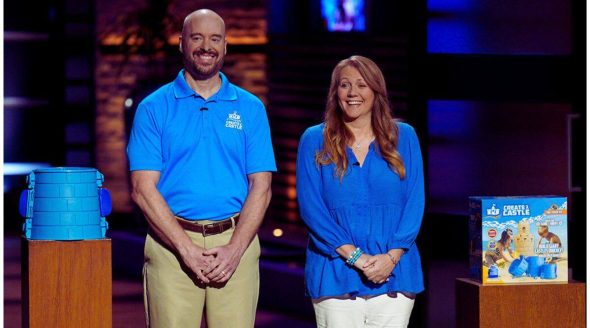
Credit: The Toy Book
Highlights
- Shark Tank season 14 witnessed a total of 88 pitches from entrepreneurs across domains.
- Mark Cuban led the list of Sharks with the most deals by investing in around 15 companies.
- Guest Sharks Tony Xu, Kendra Scott, and Gwyneth Paltrow joined the panelists for the 14th season.
Shark Tank season 14 presented itself as one of the most uniquely exciting seasons, with new Guest Sharks and a first-time-ever live audience. From recreational toys for kids to pet care products, bridal fashion wear to sustainable underwear, the season showcased a rollercoaster of ambitious pitches and intense negotiations.
Discussed below is the list of Shark Tank season 14 pitches that were the talk of the town for both the right and wrong reasons.
The Best Pitches
Shark Tank Season 14 saw a huge number of entrepreneurs belonging to varied verticals approach the Sharks with their understanding of their business, engaging product demos, and smart negotiation skills. From Create A Castle to Legacy Shave, have a look at the best pitches of the season, which drew the immense attention of both investors and audiences alike:
1. Create A Castle
Kevin and Laurie Lane were an entrepreneur couple who hoped to raise an investment worth $350K at 10% equity in their company ‘Create A Castle.’ As the name suggests, the product is a castle-making kit, which helps one make elaborate sand structures within minutes.
The couple stressed the pain point of the traditional fill and flip buckets, which produce ‘boring castles’ and, at times, the mud gets stuck in their pocket. But with the split-mode ‘Create A Castle’ kit, kids could enjoy better using its hinges that open sideways.
How was this a good pitch?
The entrepreneurs were thoroughly prepared for any questions from the judges. Guest Shark Kendra Scott was the first to inquire about the product. She asked if there was anything similar in the market; the duo revealed that there wasn’t.
Kevin then asked them about patents. To this, they replied that they had about 12 international patents. Further, they were eyeing launching an indoor product as well. Kevin interrupted them, saying this was a ‘seasonal product.’ Laurie quickly responded, stating that there was a kit for the snow as well.
They further went ahead in the pitch, highlighting the crucial numbers related to the business, including the landing and selling costs, sales made, and profits earned.
Daymond felt they were doing pretty well on their own, so he wanted to know why they needed any help from the Sharks. The entrepreneurs then revealed that they needed financial assistance with inventory. Furthermore, they were eager to lock in a licensing deal.
The only Sharks who were interested in investing were Kendra and Daymond, who offered $350K for 20% equity and $350K for 25%, respectively. Kevin and Laurie finalized the deal with Kendra.
2. Jica Foods
The entrepreneur duo of Xin and Melissa Wang made their way to the panelists seeking an investment of $300K for 3% equity in Jica Foods. This food brand offers the traditional Jicama-based snack, which is an ideal alternative to the calorie-laden tortilla.
Presenting it as the ideal snack item, they discussed its many qualities, including low-calorie count, low carb percentage, and high fiber percentage. All of these collectively lead to improved gut health.
How was Jica Foods one of the best pitches?
Jica Foods was one of the best Shark Tank season 14 pitches as it managed to keep the Sharks engaged from the beginning till the end. They did so by bringing in ‘Jicaman,’ their brand mascot, which kept the Sharks smiling throughout the pitch with its funny antics.
Additionally, the pitch was loaded with energy from both the entrepreneurs themselves, who called upon the Sharks to join them in this “Jicamania.” They even offered samples to the judges.
Barbara was the first Shark to show an interest in the venture and inquired about the pricing and profits made.
Xin explained the ups and downs they went through after starting the business in 2015. They faced a massive setback that led them to huge debts. But they came back on track in 2019 with $1 million in sales. This was followed by $4 million, $5 million, and $6 million in the next three years. The Sharks were heavily impressed with the numbers.
Mark, Lori, and Guest Shark Gwyneth Paltrow liked the product but were not interested in investing. Barbara proposed $300K for 10% equity. She further pointed out that she should be offered a pro rata distribution every time the founders took money out of the business.
Kevin then joined the negotiation bandwagon and offered $300K for 9%. Hearing this, Barbara revised her previous offer to match Kevin, i.e., $300K for 9%.
After a lot of discussion, the final deal was locked with Barbara at $300K for 6% equity and 2% as advisory shares.
3. Legacy Shave
Mike Gutow made his way to the investors in season 14 with his business venture called Legacy Shave. As per Mike, this patented shaving brush was the perfect alternative to the age old shaving brushes because it eliminated razor burns and cleansed better than ever.
The investment sought was $300K for 10% equity. The entrepreneur further revealed that the idea was a joint venture between him and his brother Dave Gutow. Additionally, the company also offered razors, shavings creams, and bar soaps.
Why is Legacy Shave considered as one of the best pitches?
Giving a live demo of his product, Mike drew a comparison between the age-old brushes and his modern creation in full exuberance. While doing so, he reiterated that he was all set to make his way into the $50 billion shaving industry.
Further, he displayed the range of Legacy Shave, which included shaving brushes for men and women, foam and gel cans, and travel size kits. The Sharks thoroughly enjoyed the pitch and called it the “best presentation ever.”
He then discussed the inspiration behind the business, which was related to an emotional story about his cancer-diagnosed father. This made the investors deeply involved; Kevin even got teary-eyed.
Thus, this pitch had all the elements which made it one of the best – idea, execution, and emotions.
The final deal was locked with Lori for $700K, along with a royalty of 3% of net sales in perpetuity for 95% of the business.
4. Bridal Babes
Entrepreneur couple Charles and Ashley Young went in front of the investors seeking $250K for 10% equity in their bridal venture. Bridal Babes offered a variety of dresses for bridesmaids of different colors who could flaunt their curves without worrying about fit.
They further went ahead elaborating on the virtual and in-person consultations with customers. Ashley’s vision for the future was to bring about new transformations in the wedding domain by presenting clients and models of different shapes and sizes.
How did Bridal Babes impress with their pitch?
Each of the panelists loved their short yet clear presentation and praised them saying, “good job.” They were in awe of the dresses and inquired about the prices.
The couple then revealed the landing and selling costs of the ‘classic collection’ to be $13.31 and $44, respectively. Similarly, the ‘deluxe collection’ was priced at $260 with a landing cost of $67.
When Kevin asked about the cost of customer acquisition, they stated that they had 60K TikTok followers and 90K Instagram followers. But their emphasis was higher on the ‘fabric.’ so the couple presented samples to the Sharks. The judges were impressed by both the product and the lifetime sales numbers, which were $2 million.
The deal was finalized with Guest Shark Emma Grede at $250K for 20% equity.
5. Wondry Wines
Seeking to disrupt the vintage wine industry, entrepreneur couple Chaz and Whitney Gates pitched Wondry Wines. The product was different from the traditional wines because it was made of fruits, not just grapes. Plus, the alcohol percentage was double that of the regular ones.
Asking for $185K for an 8% equity stake in their company, the duo presented Wondry Wines as the perfect alternative to the ‘boring’ traditional wines. They then presented their variety of samples to the judges, including Cran Apple Blanc, Sangria Especial, and Southern Country Cream.
How was Wondry Wines a good pitch?
Both Chaz and Whitney tried to keep the Sharks hooked ever since the beginning of their pitch with their small skit, which involved a narration of the product’s features. Further, upon trying the samples, the investors loved the wine.
They were thoroughly prepared for any questions and replied without hesitation. When Kevin asked why the pricing was higher than normal, Whitney said that it was because they use organic ingredients only.
Additionally, the entrepreneurs highlighted that they began this venture in 2021 and had since then made $250K in sales in a year. The profits were $60K.
Though impressed by their pitch, the Sharks chose to opt out of the deal one after the other. Mark was the only one who offered $200K for 15% equity. The couple countered it with $250K for 15% equity.
After a short discussion, the final deal was then sealed with Mark for $225K for 15% equity.
The Worst Pitches
The previous Shark Tank seasons witnessed a mix of good and bad pitches, which received praise and criticism based on their performance on the show. The story for Shark Tank Season was no different. Below are some of the worst pitches of Shark Tank season, which received negative response from the investors:
1. Banana Phone
Brian Brunsing and Max Brown approached the investors in Shark Tank season 14, seeking an investment of $250K for 10% equity in ‘Banana Phone.’ With an appearance that’s a replica of a banana, this unique product could be connected to smartphones via Bluetooth.
The idea behind coming up with the product was to add a bit of fun to the monotonous lives of people. Using a Banana Phone, one could stay away from the irritating push notifications and talk to anyone.
What went wrong with the Banana Phone?
In their pitch, the entrepreneurs revealed that for the past six years, the business was a part time venture for them. The lifetime sales were $1.6 million, with $540K made in 2021. Additionally, each phone was priced at $39.99 with a landing cost of $6. The products were not patented.
The Sharks seemed intrigued by the novelty of the product but had their apprehensions about investing for the same reason. Lori opted out of the deal, citing the risks of a novelty product.
Additionally, they were concerned about the part-time nature of the founders working for it. Barbara chose to step out for this reason.
Kevin didn’t like the idea of getting the products in retail. Robert felt it was not scalable enough.
Eventually, the founders of Banana Phone couldn’t convince any of the judges and went out without any deal. It is due to their lack of convincing skills that they have still not managed to turn their part-time venture into a full-fledged business.
2. Nopalera
Sandra Velasquez approached the judges in Shark Tank season 14 seeking investment for her skincare items made out of Nopal or cactus. Nopalera found its inspiration from her Mexican heritage, as her parents originally belonged to Mexico.
Discussing the many skin-friendly qualities of her products, the entrepreneur asked for $300K for a 5% equity in her company. Further, her product range included soaps, cleansers + scrubs, botanical bars, moisture sets, bar duos, and exfoliants.
Why was Nopalera a bad pitch?
Two prime reasons made Nopalera fall under the category of worst pitches on Shark Tank season 14.
Firstly, the valuation sought was too high. When Kevin inquired about the numbers, she revealed that the company made $19K, $607K, and $335K in 2020, 2021, and 2022, respectively.
Although impressed by the sales figures, Guest Shark Daniel Lubetzsky questioned her valuation of $6 million, which was way higher than these numbers. Daymond, too, felt the proposed equity was really low, so he stepped out of the deal.
Secondly, when Kevin then inquired about her projected numbers in 2023, Sandra didn’t have any definite answer.
This showed her unwillingness to reveal her business figures and compelled the other Sharks, including Mark, to opt out of the deal one after the other.
To Conclude
Shark Tank season 14 was the perfect showcase of the highs and lows of entrepreneurial businesses. Entrepreneurs who were aware of the essential details of their business and proposed an appropriate valuation earned the love of Sharks and bagged deals. The best examples of this are Create A Castle and Jica Foods.
On the other hand, there were times when the entrepreneurs failed to answer the Sharks or convince them to invest in their business due to a lack of preparedness.
Overall, the season saw a rollercoaster of entrepreneurial dreams, negotiations, and deals, which took the scale of the show a level higher.
References
- This woman went from making bars of soap in her kitchen to selling them at Nordstrom — all with $110K in debt, NBC Bay Area, Fernando Hurtado and Gerardo Pons






